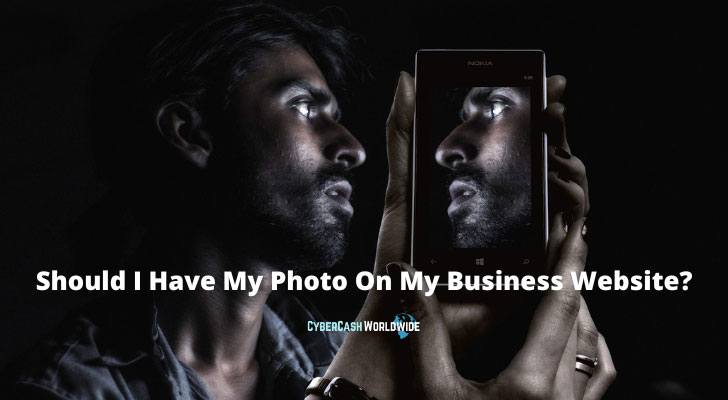The rise and fall of “personal branding” – what do you think of it? Using your own image and personal story to connect with customers on a deeper level. But now that anyone can easily fake photos. If you want to display the real you, you have to consider making it "appear" real. How crazy is that? Real, unedited photos can look fake and edited. And vice versa. Do you agree? Yes? No? Yes?

The Contradictory Issues
#1 Personalization
Adding a real photo of yourself to your site adds a personal touch, making the whole experience more relatable for visitors. It allows visitors to feel more connected to you and your business. A real photo serves as a welcoming gesture, essentially putting a face to the name and creating a stronger bond between you and your visitors.
#2 Professionalism Concerns
On the other hand, you might hesitate to include your photo due to concerns about maintaining a professional image. A personal photo can make it look out of place in a business website. It can detract from the site's professional appeal, affecting how your business is perceived.
#3 The AI-Generated Option
AI-generated images may appear to be a modern solution to the dilemma. They can be tailored to suit the aesthetic of your site - maintain human elements on your website without compromising privacy or professionalism. But frankly, AI-generated images are fake. People will know they're fake, and when they know they're fake, they'll lose trust.
With that said, everyone's using AI-generated images, so nothing's wrong about using fake images anymore.
#4 The Dilemma
We know that the manipulation technologies are increasingly becoming advanced. People look at any photos with skepticism. Fake photos that look real and real photos look fake. This means that all it matters nowadays is, how the photos will be perceived. Will they be seen as genuine or fabricated? Or should you target people who don't care?
The goal of the use of photo used to be to enhance the site's authenticity and trustworthiness, but it's probably not anymore.
CyberCash Wonderland
"CyberCash Worldwide, Brian speaking. How can I help you today?
"Hi, Bri....are you a woman?"
"Yes, is it a problem with you?"
"No, no, I just called to say the photos on your site are fantastic! Especially the one on the homepage, he seems like a friendly guy. Which one is he?"
"It's she. That's me."
"But...the person in the photo has a big mustache and bulging biceps."
"Look, transphobia is not tolerated here. If you can't treat everyone with respect..."
"Are you an AI by any chance?"
"Yes."
"So am I."
(Call ended)
The Risks of Showing Your Face Online
Identity theft could happen to anyone, as you may already know. Anyone can easily create a false identity using your name and personal information. This can lead to financial fraud.
In addition, you may also be targeted by scammers and cybercriminals. They may use your image to create fake profiles on social media or dating sites in order to lure unsuspecting victims. Once they have built up a rapport with their victim, they may then ask for money or sensitive personal information.
Also, showing your face online can also put you at risk of being harassed or stalked by online predators. They may use your image to threaten or intimidate you, or even try to track you down in real life. If you are concerned about any of these risks, it is important to take steps to protect yourself when using the internet.
Whether or Not to Reveal Your Face Online
You may worry about privacy issues or simply feel more comfortable remaining anonymous. But it’s all about what you’re comfortable with.
But if you do decide to show your face online, there are a few things to keep in mind. First, make sure that you are using a high-quality headshot. This will help you look professional and trustworthy. Secondly, be aware of the types of things you post online - remember that everything is public and permanent!
- Be confident in who you are and what you have to offer.
- Remember that everyone is different and that your unique perspective is what makes you special.
- Don't be afraid - the audience is looking for trustworthiness in you and what you have to say. Not the way you look!
- If you're still not comfortable, there are other ways to connect with your audience online (e.g., through audio or video avatar).
- Whatever you do, be genuine and authentic in your interactions with others online.
What Do You Advocate?
Online Abuse Issues
No one deserves to be a victim of online abuse. Unfortunately, this form of harassment targeting business owners online has become all too common. Whether it’s in the form of cyberbullying, doxxing, or simply trolling, online abuse can take a toll on your mental and emotional health. If you’re struggling to deal with online abuse, know that you’re not alone.
Does It Affect Online Business Owners?
As an individual online business owner, the more exposed you are, the more chances of some form of abuse you’ll experience at some point in your lives. Online abuse is often directed at female entrepreneurs, LGBT advocates, and people of color.
There are a number of different ways that marketers can be abused online. Some common examples include:
- Repeatedly being criticized about your product or content written on your site with malicious intent
- Being sent threatening or abusive messages
- Having personal information shared in malicious ways
- Having embarrassing photos or videos shared
- Being the target of cyberbullying
- Being stalked or harassed online
What Are the Consequences of Online Abuse?
When you are running a business, online abuse can affect your sales. It can damage your reputation, lead to your sales being plummeted, ruin relationships with customers, and cause anxiety and depression.
How Can You Deal With Abuse?
Here are some tips on how to deal with abuse from your audience:
- Don't engage. If someone is being abusive online, don't engage with them. This will only make the situation worse. The best thing you can do is just ignore the abuse altogether. It's not worth getting worked up about it.
- Block and report. If someone is being abusive on social media, block them and report them to the network.
- Get support. If you're feeling overwhelmed by the abuse, reach out to a friend or family member for support. Seek professional help if necessary. If the abuse is really affecting your mental health, seek professional help from a therapist or counselor.
Ultimately, the decision of whether or not to include a photo on your business website is up to you and will depend on what kind of image you want to project and how easy it would be to keep the photos updated.
How to use photos on your business website now
Fine-Tuning the Details
Making an AI-generated photo seem lifelike hinges on attention to detail. Small adjustments can hugely enhance realism:
- Focus on the eyes and shadows to ensure they convey depth and life.
- Skin texture should avoid being overly smooth; some variability adds authenticity.
- Hair edges require careful attention to avoid looking too sharp or unnaturally soft.
The adjustments contribute to the overall believability of the photo.
Matching the Context
Ensuring the photo fits seamlessly with your website's theme is good. A mismatched background or inappropriate setting can detract from authenticity:
- The background style and setting should complement your website’s overall aesthetic.
- Lighting within the photo needs to reflect the mood you’re aiming for, enhancing thematic consistency.
- Clothing and appearance in the photo should align with your brand’s image or the intended message.
Embracing Imperfections
Interestingly, introducing slight imperfections can make an AI-generated photo feel more genuine. Perfect features often signal artificiality:
- Small blemishes or wrinkles can introduce a sense of authenticity.
- Opt for expressions and smiles that include natural asymmetry.
- Slight imperfections in facial features can mirror the natural human appearance more closely.
Consistency in Quality
The photo's quality should be on par with other images across your site. Disparities in resolution or style can make the AI origins of the photo more apparent:
- Ensure the AI-generated photo matches the resolution and quality of existing site images.
- Color grading should harmonize with your site’s color scheme, avoiding any jarring contrasts.
- Proper scaling is essential to prevent pixelation, which could betray the photo's AI-generated nature.
Emotional Engagement
The photo should not only look real but also evoke a genuine emotional response from viewers. The right expression or pose can create a connection:
- Choosing an appropriate pose can convey the desired emotion or message.
- Eye contact, whether direct or averted, plays a significant role in how the image is perceived.
- Selecting facial expressions that elicit empathy or connection can make the photo more impactful.
Read More: Do I Need VPN?
If You Prefer Using An Avatar…
If you really don’t want to show up but use an avatar, then don’t use a photo of someone else but create an avatar - a digital representation of you - using an avatar maker. As long as it doesn't look too comical, childish, or threatening, an avatar can be used to communicate with your audience through your site and social media, allowing you to have control over how you express yourself within the bounds of the virtual world.
Maybe you're looking to create a new brand identity for yourself, or perhaps you want to explore a new side of your personality as a business owner. Your audience will get to know you by your character rather than your real self. This can be a great way to make new types of customers, hence more possibilities of sales.
There are plenty of online tools that can help you create the perfect image. Here are some of the avatar makers online:
- Face Your Manga: With this online tool, you can create a wide variety of avatars, including both male and female characters. There are plenty of customization options available, so you can really make your avatar unique.
- Avatar Maker: This online tool allows you to create both 3D and 2D avatars. You can choose from a wide range of different features to customize your avatar, including clothes, hair, skin color, and more.
- Bitmoji: This app allows you to create an avatar that looks just like you! You can use Bitmoji in a variety of different ways, including on social media platforms such as Snapchat and Facebook Messenger.
- Cartoonify: As the name suggests, this online tool allows you to create a cartoon version of yourself. There are plenty of customization options available, so you can make your avatar look however you want.
- Mr Hyde's Avatar Maker: This online tool allows you to create dark and gothic avatars. If you're looking for something a little different, then this is the perfect option for you.
- Chibi Maker: Chibi Maker is a great option for those looking to create cute, anime-style avatars. It offers a wide range of features, including the ability to customize your avatar's hair, eyes, clothes, and more.
- My Avatar Editor: My Avatar Editor is a great option for those looking for a simple avatar maker. It offers a basic set of features, such as the ability to change your avatar's hair color and style, eye color, and skin tone.
FAQs about avatar makers
1. How much does it cost to make an avatar?
There is no set price for making an avatar. Some platforms that offer avatar makers may charge a small fee, while others may be free to use.
2. How long does it take to make an avatar?
The amount of time it takes to make an avatar varies depending on the platform you use and the level of customization you desire. Some avatar makers may only take a few minutes to complete, while others may take longer.
3. What type of information do I need to create an avatar?
When creating an avatar, you will generally be asked to provide some basic information about yourself, such as your name, age, gender, and perhaps a photo. Some platforms may also ask you to answer questions about your interests or personality in order to generate a more accurate representation of who you are.
Should You Have Your Photo On My Business Website?
Having a photo of yourself on your business website can be a great way to show potential customers that you're a real person and not just some faceless entity. It can help build trust and make it more likely that people will do business with you. By all means, the decision is up to you.


